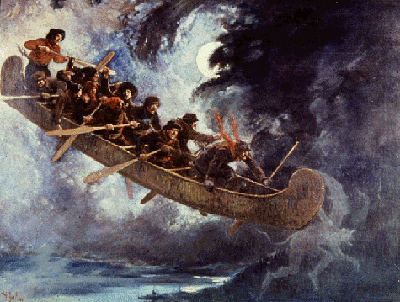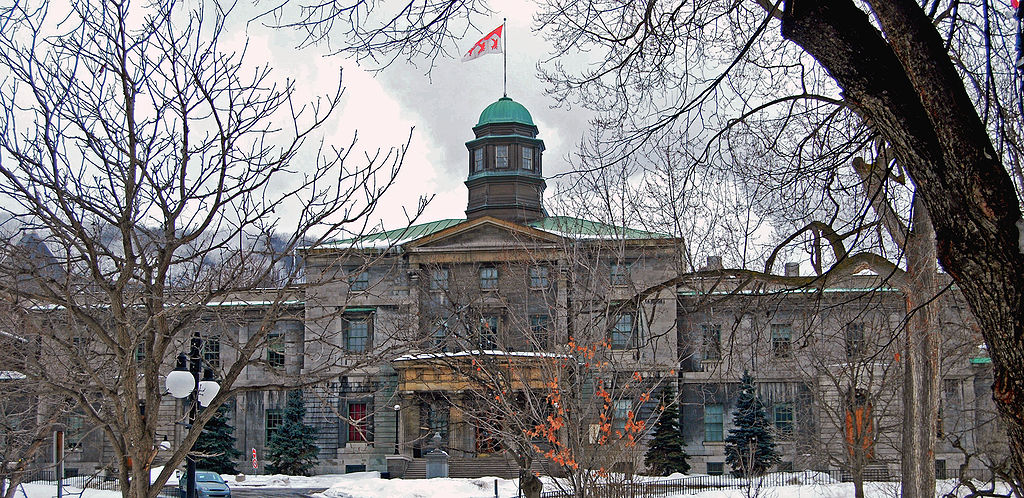The concept of “distinct society” distinguishes Quebec from English Canada.
This concept originated during the Quiet Revolution, at a time when French Canada came to no longer be seen as a single entity, but as a collection of regional francophone communities. It is found in the 1965 preliminary report of the Royal Commission on Bilingualism and Biculturalism shared by Laurendeau and Dunton. It was subsequently used on a number of occasions, notably during the negotiation of the Meech Lake Accord (1987–90). Today, the concept of “distinct society” continues to be used in debates regarding various political, social and cultural issues.

A Distinctive History
Quebec has a distinctive history which is older than that of English Canada.
From the time of Confederation in 1867, Quebec was predominantly viewed by certain elites as a rural, agricultural province. In response to the fast-paced industrialization and urbanization at the end of the 19th century, these individuals extolled the charms of a bygone era.
This view was nurtured by such popular works as the novel Maria Chapdelaine (1913; tr. Maria Chapdelaine, 1916), in addition to being further enhanced by certain scholarly works.
During the 1960s, the popularity of neo-nationalism increased, while the influence of the traditionalist views waned. However, nationalism has continued to look to the past to justify certain actions. For example, in the report regarding the teaching of history at the secondary education level, submitted in 2014 by a committee of experts commissioned by the Quebec government, the authors suggested that Quebec history courses should place greater emphasis on the national referent. They underscored that communicating knowledge of history also means having to make sense of the past and giving students the opportunity to become acquainted with their community from its earliest days; doing so will enable them to understand and be part of its history. The authors further stated that if the idea of social participation (so dear to today’s world) has a meaning, it is certain to be found in a shared discussion of the past.
A Distinctive Culture
Quebec is notable for its traditions, its religion and the language of its majority.
Many traditions are woven into the rich tapestry of Quebec culture, which includes (among other things) a wealth of stories, legends and folklore songs. (See Oral Literature in French.) An inventory was undertaken at the end of the 19th century by many amateur ethnologists (including Ernest Gagnon), in order to collect information regarding the living heritage, to promote it and to revitalize it.

Up until the time of the Quiet Revolution, Catholicism was one of the characteristics mentioned as differentiating French Canadians from other Canadians. Slowly, however, the French Language has superseded Catholicism as a key characteristic of the Quebec population. Bill 22 (1974) and Bill 101 (1977) made French the official language of Quebec. They also support the promotion of French as the common language of civil society.
The Supreme Court of Canada recognizes that the protection of the French language in Quebec may, in some instances, justify restrictions in freedom of expression. Such restrictions apply to public signage and are evidenced by the obligation for everyone, in particular, allophone immigrants, to enrol their children in the francophone school system at the primary and secondary education levels. (The only exception to this are children who have received most of their education in Canada in English and only in the event that a parent, who must be a Canadian citizen, requests it.) These language laws therefore take into account the importance of French as the main language of expression in Quebec.

Distinctive Institutions
Quebec’s institutions are also distinctive.
Some of Quebec’s institutions have no equivalent in Canada’s other provinces. One example of this is the institutional investor Caisse de dépôt et placement du Québec. Quebec is also notable for its many institutions controlled by the anglophone minority (including universities, school boards and hospitals). When reforming its institutions, the Quebec government took into account the needs of the historic anglophone minority. Thus, in the interest of public safety, as well as to respect the languages of Montreal’s two main linguistic communities, both the Université de Montréal and McGill University have their own “superhospital,” opened in 2015 and 2017, respectively.

Quebec is known, in particular, for its emphasis on Civil Law versus the Common Law tradition of the other provinces.
In fact, the Supreme Court Act provides that three of the nine judges on the Supreme Court of Canada must come from Quebec, in order to represent the civil law tradition in the Court.
A Distinctive Development
As early as the 1970s, economists and sociologists began referring to the “Quebec model” of development. Increasingly used in the public forum, this term refers to a more interventionist approach to the economy by the State. It also describes the more collaborative nature of certain Quebec financial institutions, such as the Mouvement Desjardins. In this regard, Quebec seems out of step with the general, more neoliberal, political and economic trends in North America.

Since the 1960s, the Quebec government’s involvement in the economy of the province has been particularly significant compared to that seen in Canada’s other provinces and the United States. The Quebec government plays a major role in the redistribution of wealth through the use of higher taxation and the funding of a number of social programs. One example of this is the network of child care centres, which has led to an increase in the employment rate for women. (See also Quebec Family Policy.) Another is the low cost of university tuition. Thanks to these measures, the Quebec middle class has been better able to resist the erosion seen in the middle class in the rest of Canada and the United States.
A Distinctive National Reference
Since the early days of New France, the inhabitants of Quebec have been known as “Canadiens.” Beginning in the 19th century, they were more often referred to as French Canadians and, since the early 1960s, have been known as Québécois. They are accustomed to seeing themselves as different from other Canadians. They have created their own national reference, which includes a number of symbols, such as a flag (see Fleur-de-lys). Quebec residents are called upon by the Quebec State and by many mass media organizations to acknowledge that, regardless of their origins, they have the same national identity.
In 2006, Canada’s House of Commons approved a government motion stating that “this House recognizes that the Québécois form a nation within a united Canada”.
Quebec favours an intercultural approach to integration (in contrast to Canadian multiculturalism) to manage ethnocultural diversity and to ensure the preservation of a francophone majority. (See also Francophone Nationalism in Quebec.)
Special Political and Legal Status
The federal system created in 1867 recognized the distinct nature of the francophone and Catholic institutions of the majority of Quebec’s population. In 1867, the newspaper which gave voice to the ideas of George-Étienne Cartier, one of the Fathers of Confederation, praised the new constitution. La Minerve declared: “Here we see the recognition of the French-Canadian nationality. As a distinct and separate nationality, we form a state within a state, with full enjoyment of our rights, and the formal recognition of our national independence.”
Since the time of Henri Bourassa (1868–1905), politicians and historians have promoted national duality based on the premise of a pact between two peoples at the time the Canadian Federation was created. This premise periodically resurfaced in Quebec public life, until it was generally abandoned toward the end of the 20th century.

During the 1960s, the Canadian Prime Minister, Lester B. Pearson, put forward the idea of flexible or asymmetrical federalism. This proposal was designed to meet the demands of Quebec, which was asking for greater autonomy. The subsequent federal governments continued this effort with greater or lesser degrees of openness. Beginning in 1971, for example, Quebec and the federal State entered into a series of agreements regarding immigration. This process ultimately gave Quebec powers with respect to the selection of immigrants.
Federal recognition of Quebec’s distinctiveness was the subject of much debate at the time of the Meech Lake Accord. Negotiations regarding this failed constitutional reform project took place between the federal government and the provinces from 1987 to 1990. The accord met five conditions set by the Quebec government, including the recognition of Quebec as a “distinct society” within Canada. This principle was to be used as a rule of interpretation with respect to the Constitution in the judgments by various courts.
Despite the failure of the accord, over the years, the Supreme Court of Canada has de facto recognized the distinctive nature of Quebec in a number of its judgments.
“English Canada must clearly understand that, whatever is said or done, Quebec is, today and forever, a distinct society, free and able to assume control of its destiny and its development.”
– Robert Bourassa, Premier of Quebec, at the time of the failed Meech Lake Accord in June 1990
Opposition
Some believe that Quebec should not be given special status within the Canadian Confederation.
The independentists reject this suggestion. The leader of the Rassemblement pour l’indépendance nationale, Pierre Bourgault, has voiced his opinion in this regard on a regular basis: “We do not want to be a province unlike any other; we want to be a country like any other.”
The federalists who subscribe to the vision of Canada represented, notably, by Pierre Elliott Trudeau, also reject any inclusion in the Constitution of special status for Quebec. They believe, among other things, that such a change would lead to the disintegration of the country. With its mandate regarding the equality of the French and English languages in Canada, the Commissioner of Official Languages considers that the status of Acadia and the francophone minorities in English Canada mirrors that of the anglophone minority in Quebec.
Current Implications
The concept of distinct society continues to be a focus of discussion and is used to justify Quebec’s differentiated approach to political, legal and cultural issues. For example, it is invoked when discussing reasonable accommodations, the legal framework of the family, and the management of pandemics. Nevertheless, this concept has yet to be clearly defined.

 Share on Facebook
Share on Facebook Share on X
Share on X Share by Email
Share by Email Share on Google Classroom
Share on Google Classroom






